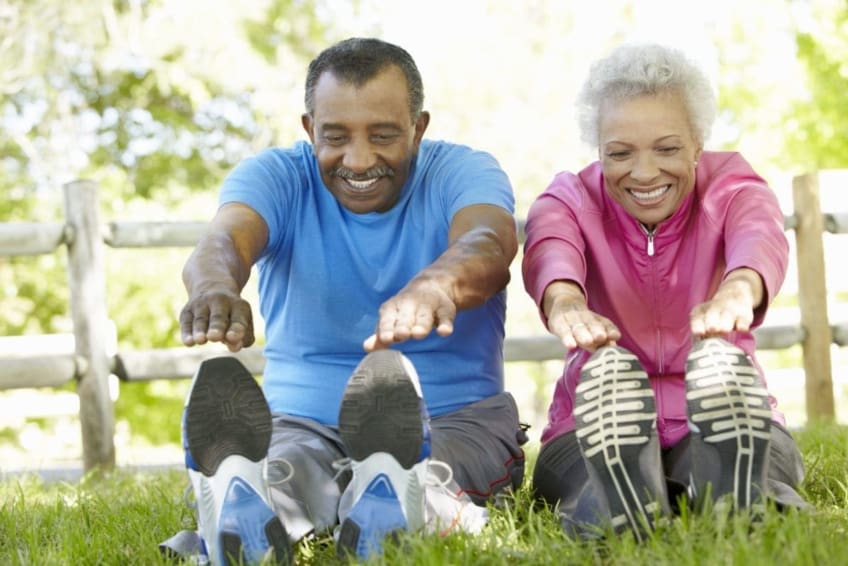
Exercise is an important part of nearly everyone’s everyday health, including older adults. Experts say seniors should be as active as possible. If you are an older adult, exercise can help you live a longer, healthier life.
There are many benefits of exercising when you’re a senior, including
- It improves your strength. This helps you stay independent.
- It improves your balance. This prevents falls.
- It gives you more energy.
- It prevents or delays diseases, such as heart disease, diabetes, or osteoporosis.
- It can improve your mood and fight off depression.
- It may improve cognitive function (how your brain works).
It is safe for most adults over 65 years old to exercise. Even most patients who have chronic illnesses can exercise safely. These include heart disease, high blood pressure, diabetes, and arthritis. Many of these conditions are improved with exercise. If you are not sure if exercise is safe for you or if you are currently inactive, ask your doctor.
Path to improved well being
There are 4 types of exercise. It’s important to include all 4 types in your exercise routine.
Endurance (cardio) — increases your breathing and heart rate. Improves the health of your heart, lungs, and circulatory system. Builds energy. Includes:
- Walking
- Jogging
- Dancing
- Swimming
- Biking
- Tennis
- Basketball
- Climbing stairs/hills
- Raking, mowing, gardening
Strength — makes your muscles stronger. Includes:
- Lifting weights
- Using a resistance band
- Doing body-weight exercises (push-ups, sit-ups)
Balance — helps prevent falls. Includes:
- Standing on one foot
- Walking heel-to-toe
- Tai chi or yoga
Flexibility — stretches your muscles, keeps you limber and more easily able to move. Includes:
- Stretching
- Yoga
How often should I exercise?
Seniors 65 and older should get at least 2.5 hours of moderate aerobic exercise (such as brisk walking) every week. That averages out to about 30 minutes on most days of the week. Or you should get 1 hour and 15 minutes of vigorous exercise (such as jogging) each week. You should also do strength training at least 2 days a week. You can work on balance and flexibility every day.
In addition, incorporate physical activity into your daily routine. Examples of working more activity into your day include:
- Taking the stairs instead of the elevator
- Walking or biking places instead of driving
- Walking your dog
- Working in the yard
- Doing light exercises while watching TV
Should I warm up or cool down before or after exercise?
Warm up for 5 minutes before you exercise. Walking slowly and then stretching are good warm-up activities. You should also cool down with more stretching for 5 minutes when you finish exercising. Cool down longer in warmer weather.
Safety tips
Check with your doctor if you’re over 50 and aren’t used to exercising before starting an exercise routine. Other reasons to check with your doctor before starting an exercise program include:
- Dizziness or shortness of breath
- Chest pain or pressure
- Blood clots
- An infection
- Sores that won’t heal
- Any joint swelling
- Recent surgery
- A hernia
Wear loose, comfortable clothing and well-fitting, sturdy shoes. Your shoes should have good arch support, and an elevated and cushioned heel to absorb shock. Make sure the shoes are made for the type of physical activity you’ll be using them for. Shoes are specially designed for walking, running, tennis, or dancing, for example.
If you are not already active, begin slowly. Start with exercises that you are already comfortable doing. Starting slowly makes it less likely that you will injure yourself. Starting slowly also helps prevent soreness.
Exercise is only good for you if you are feeling well. Wait to exercise until you feel better if you have a cold, the flu or another illness. If you miss exercise for more than 2 weeks, be sure to start slowly again.
Drink water before, during, and after you exercise, even if you don’t feel thirsty.
Things to consider
If your muscles or joints are sore the day after exercising, you may have pushed yourself too hard. Your body will adapt to this over time but if the soreness was too uncomfortable, you should lower your intensity. If the pain or discomfort persists, talk to your doctor. Talk to your doctor if you have any of the following symptoms while exercising:
- Chest pain or pressure
- Trouble breathing or excessive shortness of breath.
- Light-headedness or dizziness
- Difficulty with balance
- Nausea
Questions to ask your doctor
- Is it safe for me to exercise?
- How do I get started?
- Are there any exercises or activities I should avoid?
- Is my preventive care up to date?
- How does my health condition affect my ability to exercise?
- Which exercises will help me the most?
- I watch my diet and am not overweight. Do I need to exercise?
![]()
Copyright © American Academy of Family Physicians
This information provides a general overview and may not apply to everyone. Talk to your family doctor to find out if this information applies to you and to get more information on this subject.




